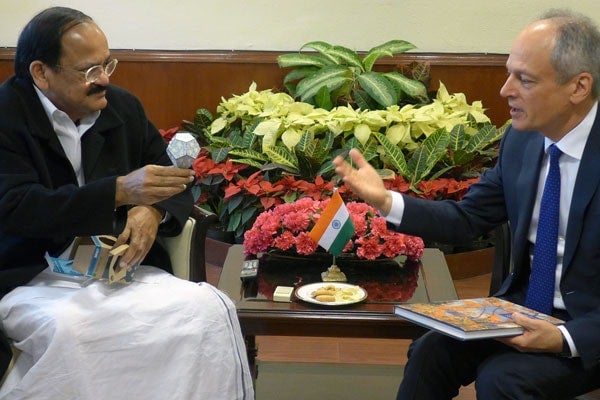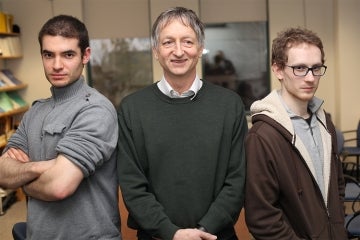
President Gertler addresses top thinkers and policy makers in India
Published: February 11, 2015
University of Toronto president Meric Gertler visited India from January 27 to 31, on his first visit to south Asia since becoming president.
While in India, Gertler co-hosted a workshop on Universities in Urbanization: Building Healthy, Sustainable & Innovative Cities with the Indian Institute of Technology-Bombay, discussed cities and urbanization with India’s largest and oldest business organization, signed a Memorandum of Understanding with Tata Consulting Services, the second largest IT service provider in the world – and took the opportunity to check out some destinations recommended by U of T students.
U of T has strong ties with India. More than 600 students from India are studying at U of T – the second largest number of international students after China. Hundreds of U of T alumni live in India and U of T researchers collaborate both formally and informally with Indian colleagues.
The trip provided an opportunity for one of the world’s leading cities experts to share his insights with colleagues at the Observer Research Foundation, India’s leading think-tank on foreign affairs. In a keynote address delivered Jan 29, Gertler highlighted the growing recognition around the world of cities as “increasingly critical national resources”, while arguing for greater recognition of the role of universities in the success of urban regions.
“The Prime Minister’s plan embraces the critical value of India’s cities to the nation’s future from the outset,” said Gertler, referring to the initiative of India’s prime minister, Narendra Modi, to build 100 “smart cities” throughout the country. “This is urbanization by design – not by happenstance. It is difficult to overstate the importance of this shift.”
In his remarks, Gertler defined smart cities as “cities whose economies are based increasingly on knowledge-intensive forms of economic activity. This relationship between smart cities and smart institutions like universities and research institutes is crucially important. And it is not nearly as well-appreciated as it should be.”

“Smart cities and universities or research institutions thrive in the same environments and fuel the same outcomes,” he said. “But I also believe that the evidence supports a stronger conclusion: that the partnership between smart cities and universities has a propulsive effect, whereby each enhances the strengths of the other. This means that if smart cities are going to achieve their full potential, they will need to leverage the advantages of nearby universities or research institutions.”
Referring to a slide showing data on the world’s top 15 urban-agglomerations by number of indexed research publications, Gertler said, “Notice the prevalence of the world’s global city-regions on the list. With one or two notable exceptions, this could be a list of the world’s economic, cultural, or socio-political powerhouses as easily as research powerhouses.”
Gertler led a delegation of faculty from across the university in his visit to India. Their itinerary included meetings with U of T research partners in Mumbai, including IIT Bombay, the TATA Institute of Social Sciences, and the TCS Co-Innovation Network (COIN).
See a video (below) shared on Twitter by @CanadainIndia (the official page of the Government of Canada in India, Nepal and Bhutan):
Gertler also delivered a second keynote address in Delhi, to the Federation of Indian Chambers of Commerce and Industry (FICCI).
See a Storify with some social media highlights of the president's trip:



